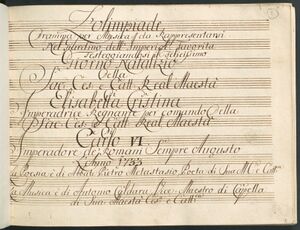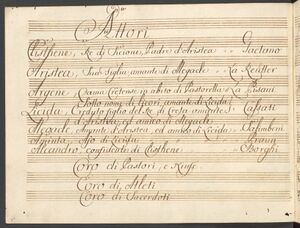Difference between revisions of "L'olimpiade (Pietro Metastasio)"
| Line 34: | Line 34: | ||
For a synopsis, see [[L'olimpiade (Pietro Metastasio)|''L'olimpiade'' (Pietro Metastasio)]] | For a synopsis, see [[L'olimpiade (Pietro Metastasio)|''L'olimpiade'' (Pietro Metastasio)]] | ||
==Roles | ==Roles== | ||
[[File:Cover page cast caldara olimpiade 1733 vienna.jpg|thumb|alt=The cast of Caldara's L'olimpiade as listed in the score | [[File:Cover page cast caldara olimpiade 1733 vienna.jpg|thumb|alt=The cast of Caldara's L'olimpiade as listed in the score | ||
|The cast of Caldara's L'olimpiade as listed in the score]] | |The cast of Caldara's L'olimpiade as listed in the score]] | ||
| Line 40: | Line 40: | ||
!Role | !Role | ||
!description (eng/it) | !description (eng/it) | ||
|- | |- | ||
|colspan="3">|<b>Prologue:</b> | |colspan="3">|<b>Prologue:</b> | ||
| Line 47: | Line 45: | ||
|Clistene | |Clistene | ||
|King of Sicione, father of Aristea (re di Sicione, padre d’Aristea) | |King of Sicione, father of Aristea (re di Sicione, padre d’Aristea) | ||
|[[Gaetano Orsini|Gaetano (Orsini?)]] | |[[Gaetano Orsini|Gaetano (Orsini?)]] | ||
|- | |- | ||
|Aristea | |Aristea | ||
|his daughter, beloved of Megacle (sua figlia, amante di Megacle) | |his daughter, beloved of Megacle (sua figlia, amante di Megacle) | ||
|- | |- | ||
|Argene | |Argene | ||
|Cretan lady disguised as the shepherdess, Licori, | |Cretan lady disguised as the shepherdess, Licori, | ||
betrothed to Licida (dama cretense in abito di pastorella sotto nome di Licori, amante di Licida) | betrothed to Licida (dama cretense in abito di pastorella sotto nome di Licori, amante di Licida) | ||
|- | |- | ||
|Licida | |Licida | ||
| Line 68: | Line 61: | ||
|- | |- | ||
|Megacle (amante d’Aristea ed amico di Licida) | |Megacle (amante d’Aristea ed amico di Licida) | ||
|[[Felice Salimbeni]] | |[[Felice Salimbeni]] | ||
|- | |- | ||
| Line 79: | Line 70: | ||
|Alcandro | |Alcandro | ||
|confidant of Clistene (confidente di Clisthene) | |confidant of Clistene (confidente di Clisthene) | ||
|- | |- | ||
| | | | ||
|nymphs, shepherds, priests, populus, | |nymphs, shepherds, priests, populus, | ||
followers of Clistene and of Aristea, guards (Coro di pastori e ninfe, coro di atleti, coro di sacerdoti) | followers of Clistene and of Aristea, guards (Coro di pastori e ninfe, coro di atleti, coro di sacerdoti) | ||
|- | |- | ||
|colspan="4"|<center>Sources:<ref name="Christoffellis"/><ref name="LibrettoItalianGoogle | |colspan="4"|<center>Sources:<ref name="Christoffellis"/><ref name="LibrettoItalianGoogle"/><ref name="Metastasio"/></center> | ||
|} | |} | ||
==Répertoire International des Sources Musicales – RISM-OPAC== | ==Répertoire International des Sources Musicales – RISM-OPAC== | ||
Revision as of 13:38, 7 October 2023
- More than one composer wrote an opera called L'olimpiade:
- For general information on L'olimpiade, stay on this page.
| L'olimpiade | |
|---|---|
| opera seria by Antonio Caldara, Antonio Vivaldi, Giovanni Battista Pergolesi, etc. | |
 Title page of a 1764 translation of the libretto, Vienna[1] | |
| Translation | dt.: Olympisches Jahrfest |
| Librettist | Pietro Metastasio |
| Language | Italian |
| Premiere | August 30, 1733 Wien |
L'olimpiade is an operatic libretto by Pietro Metastasio It was first set to music by Antonio Caldara and the opera premiered in Vienna on 30 August 1733.[2] The two more versions that immediately followed are the ones a modern listener might be most familiar with: Antonio Vivaldi's L'olimpiade as well as Giovanni Battista Pergolesi's.
Subsequently, L'olimpiade was set to music more than 60 times - the last noted one being an unfinished project by Gaetano Donizetti.[3] When Mozart wrote his concert aria KV512 "Alcandro, Io confesso ... Non sò d'onde viene" in 1787, using Clisthene's Aria from Act III Scene VI, he could count on his audience's familiarity with the topic.[4]
Synopsis
For a synopsis, see L'olimpiade (Pietro Metastasio)
Roles
| Role | description (eng/it) | ||
|---|---|---|---|
| Prologue: | |||
| Clistene | King of Sicione, father of Aristea (re di Sicione, padre d’Aristea) | Gaetano (Orsini?) | |
| Aristea | his daughter, beloved of Megacle (sua figlia, amante di Megacle) | ||
| Argene | Cretan lady disguised as the shepherdess, Licori,
betrothed to Licida (dama cretense in abito di pastorella sotto nome di Licori, amante di Licida) | ||
| Licida | generally believed to be the son of the king of Crete,
lover of Aristea, friend of Megacle (creduto figlio del re di Creta, amante d’Aristea ed amico di Megacle) |
(Pietro?) Cassati* | |
| Megacle (amante d’Aristea ed amico di Licida) | Felice Salimbeni | ||
| Aminta | tutor of Licida (aio di Licida) | Praun | |
| Alcandro | confidant of Clistene (confidente di Clisthene) | ||
| nymphs, shepherds, priests, populus,
followers of Clistene and of Aristea, guards (Coro di pastori e ninfe, coro di atleti, coro di sacerdoti) | |||
Répertoire International des Sources Musicales – RISM-OPAC
- RISM ID no.: 464110019[8]
Sources
- Deutsches Libretto 1:
- Olympisches Jahr-Fest. Welsch-gesungener vorgestellet. Von Antonio Caldara in Music verfasset
- Verlag: Ghelen
- Österreichische Nationalbibliothek
- 1733
- Olympisches Jahr-Fest. Welsch-gesungener vorgestellet. Von Antonio Caldara in Music verfasset. Vienna: Gehlen, 1733.[9]
- Deutsches Libretto 2:
- Das olympische Jahrsfest, ein Singspiel, vorgestellet auf der privilegirten Schaubühne nächst der kaiserl. Burg im Jahr 1764. In das Deutsche übertragen von J. A. E. v. G.
- Verlag: Ghelen
- Österreichische Nationalbibliothek
- 1764
- Das olympische Jahrsfest, ein Singspiel, vorgestellet auf der privilegirten Schaubühne nächst der kaiserl. Burg im Jahr 1764. In das Deutsche übertragen von J. A. E. v. G. Vienna: Gehlen, 1764.[1]
- Italian Libretto:
- "L'olimpiade, Vienna, van Ghelen, 1733". Progetto Metastasio. Retrieved October 1, 2023.[7]
- Score:
- Copyist Copyist of Vienna
- Publisher Info. Manuscript, n.d.(ca.1733).
- Misc. Notes Österreichische Nationalbibliothek, Vienna (A-Wn): Mus.Hs.17164
- Contains ballets composed by Nicola Matteis Jr..
- Work Title L'olimpiade
- Composer Caldara, Antonio
- I-Catalogue Number IAC 161
- Movements/Sections 3 acts
- Year/Date of Composition 1733
- First Performance 1733-08-30 in Vienna, Teatro della Favorita
- Librettist Pietro Metastasio (1698-1782)
- Language Italian
- Composer Time Period Baroque
- Piece Style Baroque
- Instrumentation 7 vocal soloists, mixed chorus (SATB), orchestra[10]
Antonio Caldara's L'olimpiade in Philippe Jaroussky's discography, filmography and performance history
Solo Albums/Recital albums
| Year | Album |
|---|---|
| 2010 (recorded) | Caldara in Vienna (Album) |
Complete list of musical numbers from Antonio Caldara's L'olimpiade
This listing only contains the musical pieces performed and/or recorded by Philippe Jaroussky.
| Year published or performed | Title | Album, Video or Concert Program | Year first published/performed |
|---|---|---|---|
| 2010 (recorded) | "Lo seguitai felice" | Caldara in Vienna (Album) | 1733[3] |
| 2010 (recorded) | "Mentre dormi amor fomenti" | Caldara in Vienna (Album) | 1733[3] |
References
- ↑ 1.0 1.1 Das olympische Jahrsfest, ein Singspiel, vorgestellet auf der privilegirten Schaubühne nächst der kaiserl. Burg im Jahr 1764. In das Deutsche übertragen von J. A. E. v. G. Vienna: Gehlen, 1764.
- ↑ "L'olimpiade (Metastasio)". Wikiwand. Archived from the original on October 1, 2023. Retrieved October 1, 2023.
- ↑ 3.0 3.1 3.2 "L'olimpiade (Metastasio)". Wikipedia. Archived from the original on 6 October 2023. Retrieved 6 October 2023.
- ↑ "List of concert arias, songs and canons by Wolfgang Amadeus Mozart". Wikipedia. Archived from the original on October 7, 2023. Retrieved October 7, 2023.
- ↑ "L'olimpiade". Jan Billingto, Aris Christoffelis. Archived from the original on 2016. Retrieved October 6, 2023.
- ↑ Metastasio, Pietro (1733). L'olimpiade. Pasquino. Archived from the original on October 1, 2023. Retrieved October 1, 2023.
- ↑ 7.0 7.1 "Progetto Metastasio". Landing Page. Retrieved October 1, 2023.
- ↑ "Caldara, Antonio, 1670c-1736, Manuscript". RISM OPAC. Retrieved 8 November 2021.
- ↑ Olympisches Jahr-Fest. Welsch-gesungener vorgestellet. Von Antonio Caldara in Music verfasset. Vienna: Ghelen, Österreichische Nationalbibliothek. 1733.
- ↑ L'olimpiade (Caldara, Antonio). Vienna: Manuscript, 1733.
Cite error: <ref> tag with name "booklet" defined in <references> is not used in prior text.
<ref> tag with name "QuelUsignolo" defined in <references> is not used in prior text.External links
- "Booklet Caldara in Vienna" (PDF). Idagio. Archived (PDF) from the original on October 1, 2023. Retrieved October 1, 2023.
- "Progetto Metastasio". Landing Page. Retrieved October 1, 2023.
- "L'olimpiade (Metastasio)". Wikiwand. Archived from the original on October 1, 2023. Retrieved October 1, 2023.
- "Pietro Casati". Quell'usignolo. Archived from the original on October 1, 2023. Retrieved October 1, 2023.
